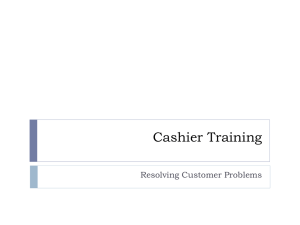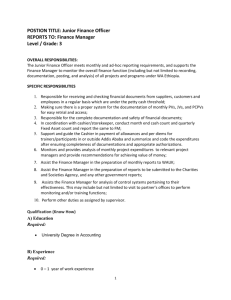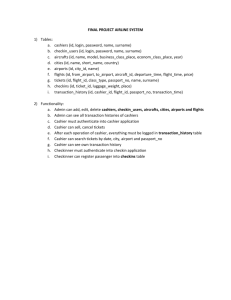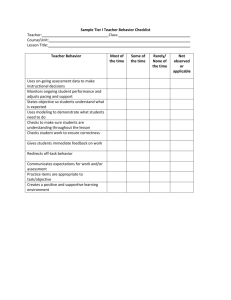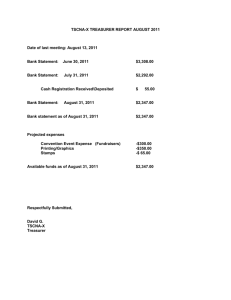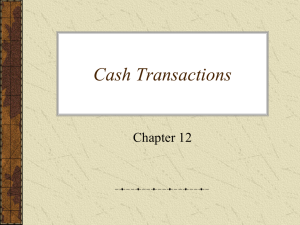Cash Handling Policy - The University of Texas at Tyler
advertisement
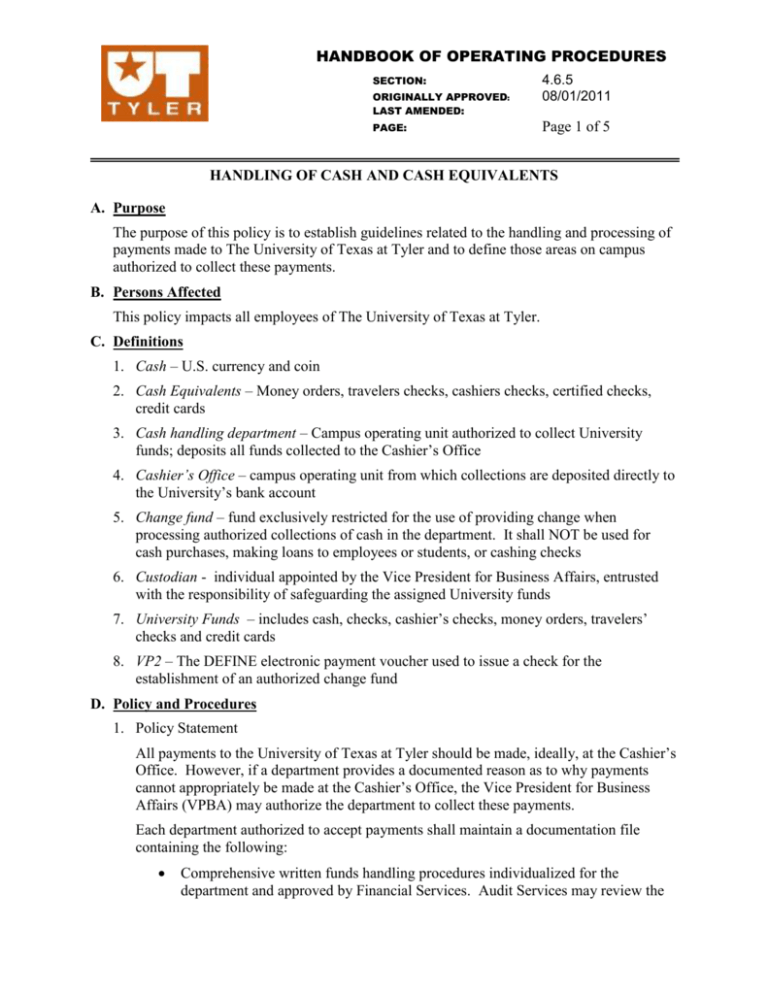
HANDBOOK OF OPERATING PROCEDURES SECTION: ORIGINALLY APPROVED: LAST AMENDED: PAGE: 4.6.5 08/01/2011 Page 1 of 5 HANDLING OF CASH AND CASH EQUIVALENTS A. Purpose The purpose of this policy is to establish guidelines related to the handling and processing of payments made to The University of Texas at Tyler and to define those areas on campus authorized to collect these payments. B. Persons Affected This policy impacts all employees of The University of Texas at Tyler. C. Definitions 1. Cash – U.S. currency and coin 2. Cash Equivalents – Money orders, travelers checks, cashiers checks, certified checks, credit cards 3. Cash handling department – Campus operating unit authorized to collect University funds; deposits all funds collected to the Cashier’s Office 4. Cashier’s Office – campus operating unit from which collections are deposited directly to the University’s bank account 5. Change fund – fund exclusively restricted for the use of providing change when processing authorized collections of cash in the department. It shall NOT be used for cash purchases, making loans to employees or students, or cashing checks 6. Custodian - individual appointed by the Vice President for Business Affairs, entrusted with the responsibility of safeguarding the assigned University funds 7. University Funds – includes cash, checks, cashier’s checks, money orders, travelers’ checks and credit cards 8. VP2 – The DEFINE electronic payment voucher used to issue a check for the establishment of an authorized change fund D. Policy and Procedures 1. Policy Statement All payments to the University of Texas at Tyler should be made, ideally, at the Cashier’s Office. However, if a department provides a documented reason as to why payments cannot appropriately be made at the Cashier’s Office, the Vice President for Business Affairs (VPBA) may authorize the department to collect these payments. Each department authorized to accept payments shall maintain a documentation file containing the following: Comprehensive written funds handling procedures individualized for the department and approved by Financial Services. Audit Services may review the HANDBOOK OF OPERATING PROCEDURES SECTION: ORIGINALLY APPROVED: LAST AMENDED: PAGE: 4.6.5 08/01/2011 Page 2 of 5 HANDLING OF CASH AND CASH EQUIVALENTS procedures periodically to ensure that an effective system of internal controls has been developed and implemented. A copy of this institutional funds handling policy. A record of training provided by the Cashier’s Office to those employees designated to accept payments. 2. Establishing a Cash Handling Department A staff or faculty member, in coordination with the budget authority of that department, will send a completed Department Cash Handling Request Form to the VPBA, stipulating the location of, justification for, and responsible parties assigned to the pointof-sale cashiering fund. This form is available on the Financial Services website on the “Forms” web page. a. Cash Handling Locations Adequate working space should be provided for each cashier in order to maintain control of the cash handling process and allow space for the processing of deposits and cash. Adequate and secure areas should be designated for balancing operations. All cashiering areas should provide for security and separation between cash handlers and customers. b. Cashiers Each area designated by the VPBA shall have at least two individuals designated as cashiers. One of the cashiers will be appointed by the VPBA as custodian of the funds. The custodian is responsible for the fund and the collection, balancing, reporting and disbursement of all cash and assets of the fund. A change in custodian will require a written notification to and approval by the VPBA. Before performing any cash handling functions, the cashier(s) must receive cashiering training which should include at a minimum a discussion of: (i) types of negotiable instruments that can be accepted; (ii) proper receipting; (iii)proper handling of checks; (iv) proper handling of coin/currency; and (v) counterfeit currency. HANDBOOK OF OPERATING PROCEDURES SECTION: ORIGINALLY APPROVED: LAST AMENDED: PAGE: 4.6.5 08/01/2011 Page 3 of 5 HANDLING OF CASH AND CASH EQUIVALENTS It is a cashier’s responsibility to alert the appropriate supervisor of any loss or theft of cash immediately upon its discovery and provide written notice of such loss or theft within 24 hours of occurrence. c. Point-of-Sale Cashiering Fund (Change Fund) The change fund is to be established by check only, not from budgeted funds. If the change fund is approved, the department will process a DEFINE VP2 payment document, in the authorized amount, using object code 5003. The check will be made payable to the custodian and, with campus ID, may be cashed at the Troup Highway and Shiloh Road branch of Chase Bank (or other Chase Bank location). The use of the change fund is exclusively restricted for the provision of change in the normal course of carrying out the authorized business activity of the department. It is NOT to be utilized for making cash purchases, making loans to employees or students, or cashing checks. Cash receipts may not be used to increase the change fund. No petty cash funds are to be established from cash receipts by any department. For information about petty cash funds, see Handbook of Operating Procedures, Section 4.6.8 – Petty Cash Funds. 3. Cash handling procedures a. Every cashier shall be assigned an individual cash drawer. No cash drawers are to be shared. Only the assigned cashier and custodian of the fund should be allowed access to the drawer. b. Cashier’s Office Only - All checks are to be endorsed with the institution name and a cashier identifier upon receipt. If immediate endorsing is not operationally possible, all checks must be endorsed before the cash drawer is closed and balanced. c. Photo identification is required for receipt on all over-the-counter checks taken. d. Each cashier drawer is to be established for an amount of funds dependent upon the use of the drawer. An annual review shall be made of each cash drawer’s assigned cash balance. e. Change funds are not to be used for petty cash or cashing of personal, payroll, or expense checks. f. Sequentially numbered receipts must be used for all transactions and daily audits and balancing of the receipts (or system reports) to the drawer is required in the closing process. HANDBOOK OF OPERATING PROCEDURES SECTION: ORIGINALLY APPROVED: LAST AMENDED: PAGE: 4.6.5 08/01/2011 Page 4 of 5 HANDLING OF CASH AND CASH EQUIVALENTS g. Cash drawers are to be balanced and closed out at the close of each cash handler’s work period. Exceptions require VPBA authorization. h. All overages/shortages are to be reported to the custodian of the fund at daily closing and must be documented as an overage/shortage in the balance process. i. Overages/shortages of $25 in a single incident or in aggregate during one month period by a cash handler must be investigated by the custodian/supervisor and may result in disciplinary action up to and including termination. j. Remote scanning and deposit of checks (on site or as part of backroom cashiering operations) should be instituted wherever cost effective to reduce processing float. k. All deposits shall be verified twice, preferably by two individuals. l. All computer and credit card terminals are to be closed out at the end of a cashier’s shift or at the end of the day. m. Documentation in the form of a summary sheet for each deposit shall be prepared before deposit to Cashier’s Office or the bank (in the case of the Cashier’s Office), indicating the amount of funds, the breakdown of funds, the accounts to be credited, and identification of the depositor. All deposits shall be documented with copies of the deposit to the Business Office. n. All deposits must be made or prepared for next day deposit, within one business day. Exception: those departments or locations whose deposit is not cost effective for daily deposits must make deposits at least twice weekly (this exception must be requested by the department on the original cash handling request form and approved by the VPBA). Checks requiring additional research or internal handling shall be photocopied by the department without delay of the deposit. A practical time table of deposits must be established considering armored car schedules. o. Cashier’s Office Only - All deposits of physical checks and cash are to be made to the bank in secure bags with identifying deposit slips indicating the amount and location of collection and tracking. All cash, physical checks and receipts should be transported in tamper proof bags. p. All deposits must be balanced to receipts, or electronic downloads from the bank, daily. q. Security codes/PINS should be assigned to individuals/cashiers for all computerized systems. No code/PIN listing should be maintained on any web based system to avoid unauthorized release of information. HANDBOOK OF OPERATING PROCEDURES SECTION: ORIGINALLY APPROVED: LAST AMENDED: PAGE: 4.6.5 08/01/2011 Page 5 of 5 HANDLING OF CASH AND CASH EQUIVALENTS r. All departments should investigate methodologies for recycling coin and currency between departments and minimizing change orders to minimize transport and vault charges. 4. Physical Security Cash and assets shall never be left unsecured or unattended. All assets shall be physically protected in safes, locked cash drawers, locking cash registers, cashiers cages, locked metal boxes, or locked drawers at all times. Safes and drop safes should be bolted in place and small receptacles secured in locked areas. Combinations or keys for cash receptacles shall be maintained only by designated custodians and supervisors. The safe registration information and combination must be reported to and maintained by the VPBA. Combinations shall be reported under seal to the VPBA and are subject to audit. 5. Theft or Loss On discovery of a possible theft or loss of funds the VPBA shall be notified and the Business Office or Audit Services will conduct an interview before the close of the business day if possible and definitively within one business day. If a theft is discovered, the supervisor/custodian shall make a verbal report to the campus Police and the Business Office before close of business followed by a written report within one business day. All counterfeit currency must by law be confiscated and segregated immediately by the cashier. If a counterfeit note is discovered subsequent to acceptance as tender for the transaction, then it must be segregated by the cashier and the account shall not be credited. A Counterfeit Note Report must be filed with the Secret Service within one business day. A complete description of the passer shall be made by the cashier immediately following the transaction in accordance with Secret Service Procedures. E. Audit All change funds, and other cash on hand, are subject to periodic, unannounced cash counts by management and/or Internal Audit. Additionally, The UT Tyler Institutional Audit Committee may request an operational audit of the area with the change drawer at any time. F. Review This policy shall be reviewed by the Director of Financial Services every five years or as legislation changes.
